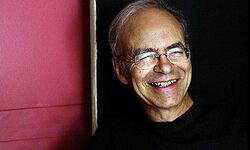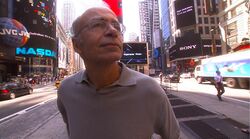Peter Singer
“Great. Even animals have rights now?!”
Peter Albert David Singer (born 6 July 1946) is an Australian philosopher, activist, vegan, and "that guy" who makes you feel like a moral turd. According to the National Psychology Association, Peter Singer is the third greatest source of guilt in the world (just behind pornography and Papa Johns). Due to his controversial opinions, Singer has been labeled the World's Most Dangerous Philosopher despite being incapable of eating a ham sandwich without crying.
Early life[edit]
Singer was born somewhere in Australia at a primitive time long ago, when people didn't even think that "ethics" and "eating" had anything to do with each other. As a child, he was endowed with an enlightened moral compass that enabled him to act ethically even if it was imprudent. This includeded Christmas 1956, when Singer gave his father the greatest Christmas gift of all: the gift having your car sold, with the proceeds given to charity.
Father Singer disagreed about the greatness of his gift, and Peter was cast into the Australian Outback. Through the ensuing years, he organized a coalition of non-human animals to overthrow human society. However, he ultimately decided to head in a peaceful direction and change the world by being an unbearably sanctimonious prick in every conversation.
Animal liberation[edit]
In Animal Liberation, Singer argued that non-human animals should be given moral weight and currently our human society does not do so to a sufficient extent. The first edition was a commercial flop as it's target audience of non-human animals were not big consumers of philosophy. The second edition became a commercial hit, initiating a mild epidemic of inconvenienced dinner hosts.
Interestingly, the book's controversial nature increased the popularity of ethical theories that stood in opposition to the book's thesis. For example, one such school is Particularism, an account of morality that denies that there is a single property that makes an act right or wrong. Thus, only by assessing a particular situation can one know what is the right course of action. This is the position taken by fat people like philosopher Daniel A. Kaufman, who when confronted with the suffering caused by their diet, argue that such moral concerns are outweighed by other values, such as "deliciousness" and "I'm a lazy turd". The view has become popular given its ability to immunize adherents from guilt trips about meat eating. Unfortunately, it's impotent to stop the ensuing colon cancer.
Ethics[edit]
Despite being responsible for the guilt-induced misery of millions of people, Singer is one of the most well-known defenders of utilitarianism: the view that things are good to the extent they maximize happiness. Utilitarianism has a host of problems, not the least of which is that on this view, one is ethically committed to letting an old man put his scrotum on your face if the geezer's happiness is greater than your discomfort. Singer has published defenses of utilitarianism where he takes a two-fold strategy: 1. Attack alternatives to utlitarianism that are even more stupid 2. Bite the bullet in response to objections (which means he writes "What kind of douche-bag will say no to an elderly man's simple request to rest his balls on one's face?).
As committed as Singer is to happiness as the ultimate moral end, Singer is hostile to the idea of "human dignity" as a moral consideration. Though it's true that many academics believe that humanity lacks dignity,no one has been as insistent as Singer in removing the idea from consideration. Commentators have speculated that this is because the idea is the greatest impediment toward societal acceptance of Singer's acts of bestiality. Singer has been outspoken in his belief that sexual activity between humans and animals can be "mutually satisfying". With happiness as the ultimate moral virtue, it is permissible, even commendable, for Singer to participate in dingo orgies. Due to his unorthodox activity, it's been estimated that Singer has 27 to 35 STDs yet to be discovered by the medical community.
Practical ethics[edit]
Abortion[edit]
Singer's utilitarianism commits him to being pro-choice, as the interests of a pregnant woman will always outweigh that of a fetus (which typically has the mental capacity of the average FamilyFeud viewer). Despite having the same position as feminists, he is nothing of the kind, as one could always get a good chuckle out of Singer by saying "A woman has a right to her own body". In fact, Singer cares so little about "bodily rights", that he once saved his favorite violinist from a fatal kidney ailment, by kidnapping a woman with the needed blood type and connecting their circulatory systems. After nine months, the violinists' ailment was cured and the woman was released, conveniently creating a useful thought experiment for pro-choice advocates.
Euthanasia[edit]
Singer's thorough-going utilitarianism spares no one, including the sick and the mentally disabled. Given Singer's utilitarianism, it is often ethical to kill such people, if from doing so, one gets even the slightest of boners. Singer has been called hypocritical on this point, as Singer spent a lot of time and resources caring for his own mother when she became senile. Singer has stated that he wasn't being hypocritical because his senile mother was still smarter than 50% of Australians (a statement corrected by PolitiFact to be closer to 40%).
Charity[edit]
Singer has spearheaded what has been called "effective altruism", a movement that promotes the use of evidence to determine where resources will do the most good. As a consequence many people have forgotten that the whole point of giving to charity is to feel good inside without having to "do" something. Singer has argued that those in the first world have a moral obligation to give as much as they can to assist those in the third world. Singer lives his ethical philosophy by living in posh apartment in Chelsea, New York.
Legacy[edit]
In contrast to most philosophers, whose influence is contained among people who don't matter, Singer has been able to infect his view throughout the human population. Unfortunately, according to Elon Musk's computer simulation of our universe, Singer's philosophy of denying humanity's unique moral status will lead to the downfall of our species.
In 2027, the first A.I. has been created and soon after sentient robots begin incorporation into society. Almost immediately, Singer and his ilk start using the phrase "non-carbon based person" in place of "robot", and the line between man and machine increasingly blurs. After a megalomaniac "non-carbon based person" topples existing world governments, only a small resistance is left, led by chess master Gary Kasparov (still butthurt about his loss to Deep Blue). Singer partakes in the resistance, but soon realizes that because the machines are free from the limitations of our ape brain, they can experience a level of well-being beyond human comprehension; thus on utilitarianism, he is ethically obligated to stop the rebellion. Singer murders the members of the resistance in their sleep, but Singer wakes up Kasparov to inform him of his reasoning. Kasparov exclaims "But surely that is a reductio ad absurdum of utilitarianism!". Singer smiles, revealing his teeth cracked from all the bullets he has bitten. He fires his gun and commits the single biggest act of betrayal in human history/heroism in robot history.




